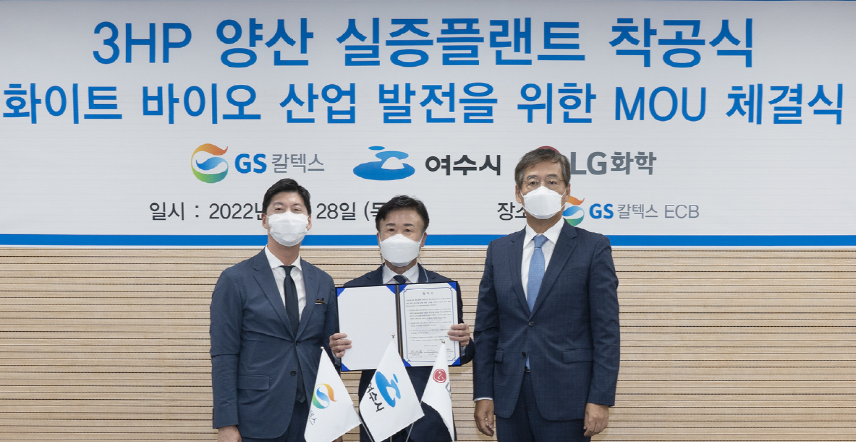
■ On the 28th, the companies began construction of 3HP pilot plant for eco-friendly bio raw materials… prototypes to be produced prior to 2023
■ The two companies and Yeosu-si signed an MOU for the development of bio industry, gains the city’s assurance on proactive administrative support
Chief Executive Officer Hak Cheol Shin,
“It bears great significance that the leading Korean oil & chemical companies joined hands for sustainable future,” and added “Starting with the establishment of 3HP pilot plant in Yeosu-si, the two companies will continue to strengthen cooperation for carbon neutrality in white bio area”
With GS Caltex, LG Chem will kickstart establishing a pilot plant to build white bio ecosystem and commercialize bio raw materials.
On the 28th, LG Chem’s CEO Hak Cheol Shin, GS Caltex’s CEO Se-hong Heo, Yeosu-si’s mayor Ki Myung Cheong, and R&D personnel from both companies attended the groundbreaking ceremony at GS Caltex’s Yeosu plant. The upcoming pilot plant will produce prototypes of 3HP (3-Hydroxypropionic acid), a key material for eco-friendly materials such as biodegradable plastics.
3HP is a biomaterial produced through an eco-friendly fermentation process, and is used as a base material for acrylic acid, acrylonitrile, and biodegradable materials. From personal hygiene products to lightweight materials for electric vehicles, 3HP is considered to be highly applicable and expandable. In November last year, the two companies signed a Joint Development Agreement(JDA) to develop 3HP’s mass production technology and produce prototypes.
By 2023, both companies plan to establish a 3HP pilot plant at GS Caltex’s Yeosu plant and produce prototypes. Afterwards, the companies will accelerate its market entry into biodegradable materials and various bioplastics through commercialization.
The construction of the pilot plant is meaningful in that LG Chem’s fermentation source technology and GS Caltex’s separation and purification process scale-up technology will create synergistic effects in kickstarting high value-added eco-friendly biochemical business. On a global scale, there were attempts to develop 3HP technology, but there haven’t been cases of commercialization.
In addition to 3HP, LG Chem and GS Caltex signed an MOU to develop 1,4-Butanediol (BDO) technology, which is used as an eco-friendly raw material to manufacture biodegradables and polyurethane. Through the agreement, the two companies will collaborate in the overall white bio sector and will engage in active discussions on measures to realize a sustainable bio ecosystem.
Furthermore, Yeosu-si, LG Chem, and GS Caltex signed a trilateral MOU for the development of Korea’s white bio industry and vitalization of carbon neutrality as well as circular economy. Through the agreement, Yeosu-si pledged to provide full-fledged administrative support for the demonstration project, and the two companies promised to prioritize Yeosu-si as a site for new factory construction in future commercialization efforts.
Hak Cheol Shin, CEO of LG Chem said “It bears great significance that the leading Korean oil & chemical companies joined hands for a sustainable future,” and added “Starting with the establishment of 3HP pilot plant in Yeosu-si, the two companies will continue to strengthen cooperation for carbon neutrality in white bio area.”
Se-hong Heo, CEO of GS Caltex said “It is a meaningful day for us to take the first step in white bio business at Yeosu National Industrial Complex.” and added “Moving forward, GS Caltex will spare no efforts in realizing resource efficiency and building a circular economy through R&D in white bio sector to bolster its ESG capabilities and bring about a sustainable bio ecosystem.”
In the meantime, LG Chem has the exclusive ownership over the world’s best 3HP fermentation technology. In October 2020, the company succeeded in developing PLH(Poly Lactate 3-Hydroxypropionate), the world’s first biodegradable new material that is capable of realizing mechanical properties equivalent to synthetic resins.
In July 2019, LG Chem succeeded in its commercial production of eco-friendly PCR white ABS for the first time in the world. The company plans to commercialize PBAT(Polybutylene Adipate-co-Terephthalate) and PLA(Poly Lactic Acid) by 2024 and 2025, respectively.
Furthermore, LG Chem plans to fulfill a decarbonization strategy in its overall supply chain through the efforts such as 100% renewable energy conversion, LCA(Life Cycle Assessment) performance, management of responsible resource procurement policy, and development of carbon dioxide conversion technology, aiming to achieve ‘Net Zero by 2050.’
Source
LG Chem, press release, 2022-08-01.
Supplier
Share
Renewable Carbon News – Daily Newsletter
Subscribe to our daily email newsletter – the world's leading newsletter on renewable materials and chemicals










